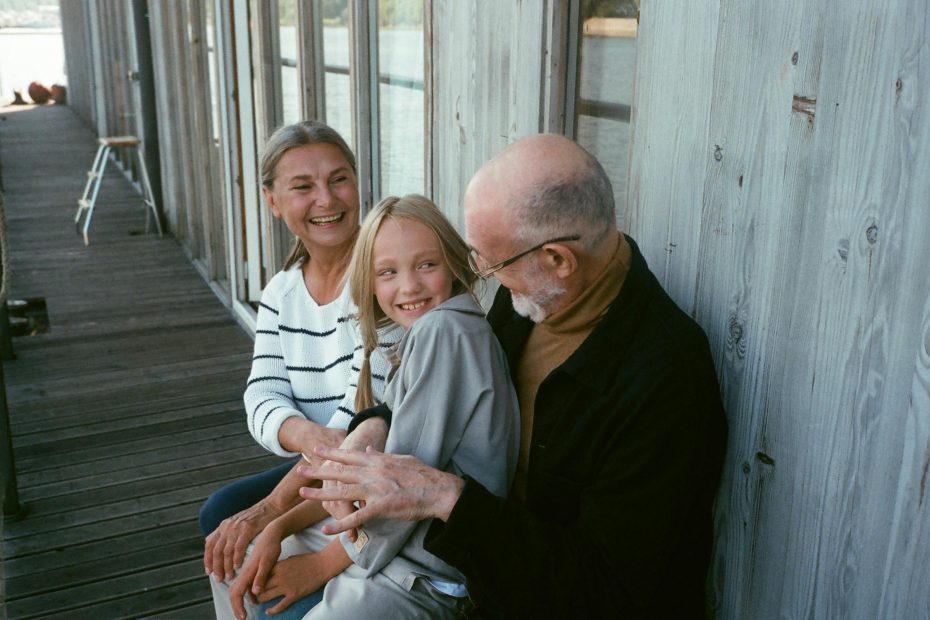Integrating a stepparent into a new family can be a delicate and often challenging process. However, one of the most important figures in this adaptation, who often doesn’t receive the attention they deserve, are the grandparents. The interaction between grandparents and stepchildren can have a significant impact on the success of the family integration, whether positive or negative. After all, grandparents are family members with much experience, wisdom, and often unconditional affection, but their attitudes and perspectives can directly influence the family dynamic.
In this article, we will explore how the role of grandparents can affect the integration of a stepchild into the new family, the possible difficulties that may arise, and how to deal with generational differences to ensure a harmonious and healthy coexistence.
Grandparents: A Bridge Between Generations and Family Cultures
Grandparents play a key role in many families, not only as caregivers and transmitters of traditions but also as emotional mediators. When a new family relationship is formed—such as in the case of a stepmother or stepfather welcoming a stepchild—the grandparents can play important roles both as supporters and resistors to the stepchild’s adaptation. How they interact with the stepchild can be crucial to the family integration process.
The Positive Impact of Grandparents on Adaptation

-
Offering Emotional Support
One of the greatest contributions grandparents can make to a stepchild’s adaptation is emotional support. They can be a source of stability for the child or adolescent, providing a safe refuge where they feel welcomed, understood, and loved. Since grandparents are often not involved in the daily pressures of managing the home and parental responsibilities, they have the ability to dedicate more emotional attention to the stepchild.
If the adaptation is difficult, the emotional support from grandparents can serve as a balancing point. They can help the stepchild deal with feelings of insecurity, fear, or resistance to change, making them feel valued and accepted. Furthermore, the relationship with grandparents can be an important support factor for the biological parents who are trying to balance the responsibilities of caring for their children and the new family dynamic.
-
Passing on Traditions and Values
Grandparents have a strong connection to the family’s history and often play a central role in passing down traditions, values, and stories. For the stepchild, this connection to family tradition can be a way to feel included, creating a stronger bond with the new family.
For example, grandparents might invite the stepchild to participate in family events such as birthdays, holiday celebrations, or even small everyday traditions like preparing a special meal. These activities create moments of unity and help the stepchild develop an emotional connection with all family members, as well as make the integration process smoother.
-
Fewer Challenges in Adaptation
Often, grandparents have a more flexible and understanding view of family relationships, since they have experienced many changes throughout their lives. This can lead to a more patient and less rigid approach when a stepchild enters the family. Instead of demanding that the stepchild accept the situation immediately, grandparents can help ease conflicts by offering valuable advice and practicing active listening.
Possible Challenges in the Relationship Between Grandparents and Stepchildren
Although grandparents can have an extremely positive impact, it is not always easy for all family members to adjust to the presence of a stepchild. Often, grandparents may have their own difficulties in adapting to the new family setup, and this can reflect in how they treat the stepchild. This can create additional challenges for both the stepchild and the parents.
-
Different Expectations of Family Life
The way grandparents deal with a stepchild may be influenced by the generation in which they grew up. In some families, especially in more traditional cultures, the idea of “family” may be more rigid, which can make accepting a stepchild as part of the family structure more difficult. Grandparents may have an idealized vision of how family bonds should be formed, and when they see the stepchild as a “stranger,” they may resist creating a real bond with them.
This can lead to feelings of rejection or indifference on the part of the stepchild, making their adaptation even more difficult. To resolve this, it is necessary for both parents and grandparents to have open discussions about their expectations and how everyone can contribute to creating a more welcoming family environment.
-
Conflicts of Authority and Discipline
In many families, grandparents play an active role in the upbringing and discipline of children. However, when there is a stepchild involved, grandparents may feel their role is being questioned or even threatened by the presence of the new family member. This can lead to conflicts about who has the authority to discipline or guide the stepchild. Additionally, grandparents may take a more permissive or stricter approach to rules than the biological parents, creating disagreements about house rules.
In this case, it is important for both parents and grandparents to have open conversations about how to share responsibilities in a balanced way. Transparency and mutual respect are essential to prevent tensions from rising and for the stepchild not to feel confused about the family norms.
-
Resistance to the New Family Setup
While the support from grandparents is often positive, some may struggle to accept the new family structure. In some cases, the presence of a stepchild may be seen as a “replacement” of the grandparent’s place in the child’s life, which can lead to jealousy or even resentment. These feelings can create an emotional barrier that makes the stepchild’s integration harder.
To handle this, it is crucial that grandparents are guided by empathy and understanding. Recognizing that the stepchild is not trying to replace anyone but is merely integrating into the family in a positive way can help smooth over generational conflicts. In this process, clear communication and affection are essential.
How to Handle Generational Differences?
Generational differences can be one of the greatest obstacles to stepchildren’s adaptation, but they also offer an opportunity for mutual learning. Here are some tips for handling differing perspectives between grandparents, parents, and stepchildren:
-
Promote Open and Respectful Dialogue
Creating an environment of open dialogue among all family members is key to resolving misunderstandings and aligning expectations. Parents should encourage grandparents to express their concerns, while also ensuring that the stepchild feels heard and supported. It is important to create a safe space where everyone feels comfortable speaking about what bothers them and what makes them feel good.
-
Involve Grandparents in the Adaptation Process
Grandparents can be powerful allies in a stepchild’s adaptation process, especially if they are actively included in family activities and events. Participating in bonding moments like family meals, outings, or festive events can help create a more relaxed and welcoming atmosphere. This allows the stepchild to see the grandparents not as distant figures but as affectionate members of their new family.
-
Teach Respect for Differences
An essential part of coexisting among different generations is learning to respect differences. Parents can act as mediators between the grandparents and the stepchild, helping them understand each other’s perspectives. Teaching the stepchild to value the grandparents’ wisdom while also showing the grandparents that the stepchild needs a space to grow and adjust is essential for peaceful coexistence.
Conclusion: A Fundamental Role in Building a United Family
The role of grandparents in a stepchild’s adaptation to the new family should not be underestimated. With empathy, patience, and open communication, grandparents can become powerful allies in creating a welcoming and inclusive environment. By addressing generational differences in a respectful and mature way, we can ensure that everyone, from the stepchild to the grandparents, feels loved and part of the new family. The adaptation process may be challenging, but with the right support, it is possible to create a lasting and strong family bond.
